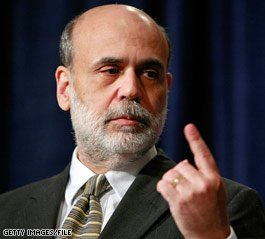U.S. banks getting more than $163 billion from the Treasury Department for new lending are on pace to pay more than half of that sum to their shareholders, with government permission, over the next three years.
The government said it was giving banks more money so they could make more loans. Dollars paid to shareholders don't serve that purpose, but Treasury officials say that suspending quarterly dividend payments would have deterred banks from participating in the voluntary program.
Critics, including economists and members of Congress, question why banks should get government money if they already have enough money to pay dividends -- or conversely, why banks that need government money are still spending so much on dividends.
"The whole purpose of the program is to increase lending and inject capital into Main Street. If the money is used for dividends, it defeats the purpose of the program," said Sen. Charles E. Schumer (D-N.Y.), who has called for the government to require a suspension of dividend payments.
The Treasury plans to invest up to $250 billion in a wide swath of U.S. banks in return for ownership stakes, which the government will relinquish when it is repaid.
Among other restrictions, participating institutions cannot increase dividend payments without government permission. They also are barred from repurchasing stock, which increases the value of outstanding shares.
The 33 banks signed up so far plan to pay shareholders about $7 billion this quarter. Companies generally try to pay consistent dividends and, at the present pace, those dividends will consume 52 percent of the Treasury's investment over the initial three-year term.
"The terms of our capital purchase program were set to encourage participation by a broad array of financial institutions so they strengthen their financial positions," Treasury spokeswoman Michele Davis said.
The Treasury's approach contrasts with decisions by foreign governments, including Britain and Germany, to require banks that accept public investments to suspend dividend payments until the government is repaid. The U.S. government similarly required Chrysler to suspend its dividend payments as a condition of the government's 1979 bailout.
The legislation passed by Congress authorizing the Treasury's current bailout program is silent on the issue.
The first nine participants were major banks, some running short on capital, that were told by Treasury officials earlier this month to sign on to the program for the good of the country. Their major shareholders are primarily institutional investors, such as pension funds and mutual funds, although a few wealthy individuals hold large stakes, such as Warren Buffett in Wells Fargo and Prince Alwaleed bin Talal in Citigroup.
Several banks are on pace to pay more in dividends than they get from the government. The Bank of New York Mellon got $3 billion from the government on Tuesday. It will pay out $275 million to shareholders this quarter, and a projected $3.3 billion over the next three years. A spokesman declined to comment.
'Business' 카테고리의 다른 글
| Can the Chevy Volt Save GM? (0) | 2008.10.30 |
|---|---|
| Foreclosures: Feds to the Rescue? (0) | 2008.10.30 |
| Porsche To Profit From Volkswagen Squeeze (0) | 2008.10.30 |
| Qwest 3Q profit down; will cut 1,200 jobs (0) | 2008.10.30 |
| Sony Q2 profit down 90 pct,may miss latest outlook (0) | 2008.10.30 |






